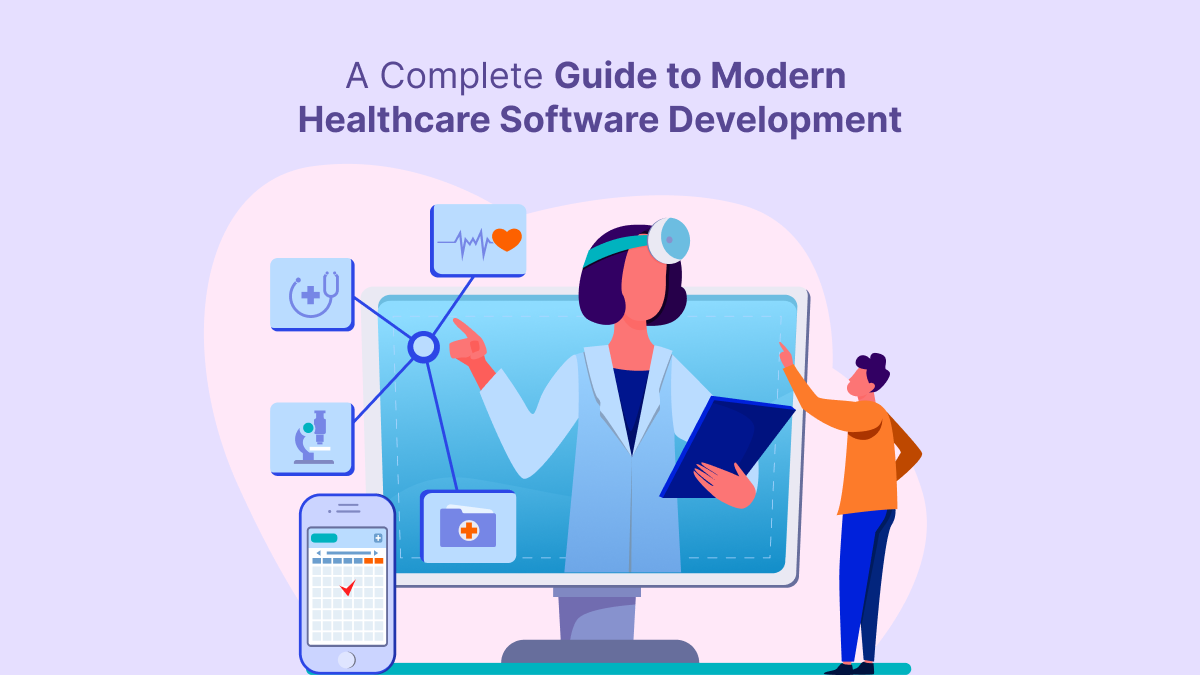Introduction: Why Modern Healthcare Needs Modern Software
Healthcare is evolving at a fast pace. With the growing demand for better patient care, faster diagnostics, and more efficient operations, healthcare providers are turning to modern software solutions. Whether it’s hospitals, clinics, or startups, everyone is looking for digital tools that help reduce manual work, cut down on errors, and improve overall service delivery.
Modern healthcare software development plays a big role in this shift. From electronic health records (EHRs) to telemedicine apps and patient portals, technology is helping transform healthcare from the ground up. But developing healthcare software is not like building a regular app. It requires a clear understanding of healthcare workflows, compliance requirements, patient data security, and more.
This guide explains what modern healthcare software development is all about, the key stages involved, the types of healthcare software being built today, and what businesses should consider when planning their own solution.
Understanding Healthcare Software Development
What Is Healthcare Software Development?
Healthcare software development refers to the process of designing and creating digital systems that assist in various medical and administrative tasks. This includes applications for managing patient records, scheduling appointments, processing medical billing, supporting telehealth services, and even AI-based diagnostics.
Why It Matters
Healthcare is a complex industry where even small delays or errors can have serious consequences. With the right software in place, healthcare providers can:
- Access patient data in real-time
- Automate repetitive tasks
- Reduce paperwork and human error
- Improve patient engagement
- Comply with legal and data security standards
Key Types of Healthcare Software
Electronic Health Records (EHR/EMR)
EHR systems are digital versions of paper charts. They store patient history, test results, diagnoses, and more in one place. A good EHR system improves information sharing among doctors and allows faster decision-making.
Telemedicine Platforms
Telemedicine apps allow doctors to consult with patients via video calls. These platforms are crucial for providing care to remote or busy patients and became especially important during the COVID-19 pandemic.
Medical Billing Software
These systems help manage billing, insurance claims, and payments. They automate complex processes, reduce errors, and ensure healthcare providers get paid on time.
Appointment Scheduling Systems
These systems allow patients to book, reschedule, or cancel appointments online. They reduce no-shows and help staff manage their daily schedules more efficiently.
Patient Portals
Patient portals give patients access to their medical records, prescriptions, and upcoming appointments. They help patients take control of their health and reduce calls to clinics.
Custom Healthcare Apps
Many organizations now build custom healthcare apps for services like mental health support, chronic disease management, or fitness tracking. These apps are often made with specific patient groups or services in mind.
Stages of Healthcare Software Development
1. Requirement Gathering
The first step is understanding what the organization needs. This involves speaking with doctors, administrative staff, patients, and IT teams to get a clear idea of the problems they face and what features are needed.
2. Planning and Design
Once the requirements are clear, the development team creates a project plan. This includes timelines, budgets, features, and design mockups. UI/UX designers ensure the software is easy to use for both patients and healthcare professionals.
3. Development
Developers begin writing code to build the app. Whether it’s a web-based platform or a mobile app, it’s created using suitable technologies. In healthcare, this also involves building strong data encryption and secure login systems.
4. Integration
Healthcare apps often need to connect with other systems like EHRs, lab software, or insurance databases. The integration phase ensures the new software communicates well with existing systems.
5. Testing
Before launch, the software goes through various levels of testing. This includes functionality testing, usability testing, and security testing. Bugs are fixed, and the app is refined until it meets the highest standards.
6. Deployment
After testing is complete, the software is launched. In a hospital setting, this might involve installing the software on all systems or training staff on how to use the new tools.
7. Maintenance and Updates
The software needs to be maintained over time. This includes fixing bugs, updating features, and ensuring it continues to comply with any changes in healthcare regulations.
Challenges in Healthcare Software Development
Data Security and Privacy
Healthcare data is extremely sensitive. Developers must ensure that patient data is protected through encryption, secure APIs, and role-based access. Compliance with laws like HIPAA (U.S.) or GDPR (Europe) is essential.
Integration with Legacy Systems
Many hospitals still use outdated systems. New software must be able to connect and work with these systems to ensure smooth operations and data migration.
Regulatory Compliance
Healthcare software must follow strict regulatory guidelines. This varies by country and may involve getting certifications or passing government audits before launch.
Usability and Adoption
If the software is too complex, doctors and nurses may resist using it. That’s why good UI/UX design and user training are key to successful adoption.
Read more: How Custom Healthcare Software Development Solutions Improve Efficiency?
How Healthcare Startups Can Benefit from Clone App Development
Building a healthcare app from scratch can be expensive and time-consuming. For many startups, working with a clone app development company is a smart move. These companies replicate the core functionality of successful apps and customize them to suit your specific needs.
For example, you could create a custom version of an app like Zocdoc or Teladoc, with added features, branding, and workflows suited to your business. This speeds up development, reduces cost, and lets you focus on innovation and user experience.
Clone apps are a great fit for:
- Mental health support platforms
- Online doctor consultation apps
- Online pharmacy systems
- Fitness and wellness trackers
- Chronic care management tools
Future Trends in Healthcare Software
AI and Machine Learning
AI is being used to detect patterns in patient data, assist in diagnostics, and predict disease outbreaks. Machine learning can also help create personalized treatment plans.
Internet of Medical Things (IoMT)
Devices like smart inhalers, heart monitors, or wearable fitness trackers are part of the IoMT ecosystem. Software can collect data from these devices and use it to monitor patient health in real-time.
Blockchain in Healthcare
Blockchain technology can help create secure, tamper-proof health records that can be accessed across institutions with patient consent. This improves data privacy and record portability.
Cloud-Based Healthcare Solutions
Cloud solutions allow healthcare providers to store data securely, access software from anywhere, and scale quickly as patient numbers grow.
Choosing the Right Development Partner
Whether you’re a hospital or a startup, choosing the right development partner is one of the most important decisions you’ll make. Look for a team that understands healthcare regulations, has a proven track record in custom development, and can scale with your business.
For startups, an on demand app development company can help you create quick, user-friendly solutions that address market needs fast—especially in areas like telemedicine, home care, and patient monitoring.
Conclusion
Modern healthcare software development is about more than just digitizing records. It’s about building smart, secure, and efficient systems that improve the way care is delivered. From streamlining daily tasks to enabling remote consultations and improving data insights, healthcare software is transforming the industry at every level.
Whether you're planning a full hospital management system or a simple mobile app for remote care, the right development approach is crucial. By partnering with experienced developers or a trusted on demand app development company, you can bring your vision to life, improve efficiency, and make a meaningful impact on both providers and patients.
Frequently Asked Questions
What is healthcare software development?
Healthcare software development is the process of creating digital tools like EHR systems, telemedicine apps, and patient portals to help healthcare providers manage tasks and improve patient care.
How long does it take to develop a healthcare app?
The timeline depends on the complexity of the app. A basic version may take 2–3 months, while more advanced systems with integrations and compliance checks can take 6 months or longer.
Why is custom software better than off-the-shelf solutions for healthcare?
Custom software is built to match your specific workflows and needs. It reduces unnecessary features, increases adoption, and improves long-term efficiency and scalability.
Is it safe to store patient data in healthcare apps?
Yes, if the app is built with proper security measures like encryption, role-based access, and compliance with laws such as HIPAA or GDPR.
Can startups use clone app development for healthcare apps?
Yes, clone app development helps startups launch faster and save costs by replicating successful app models and customizing them for specific healthcare use cases.







Comments